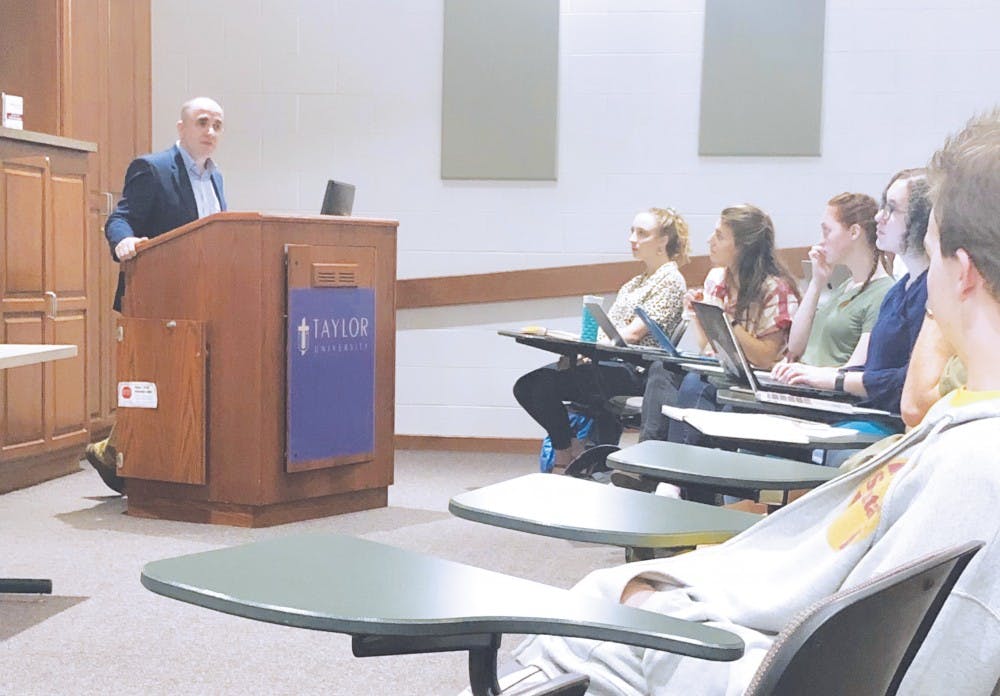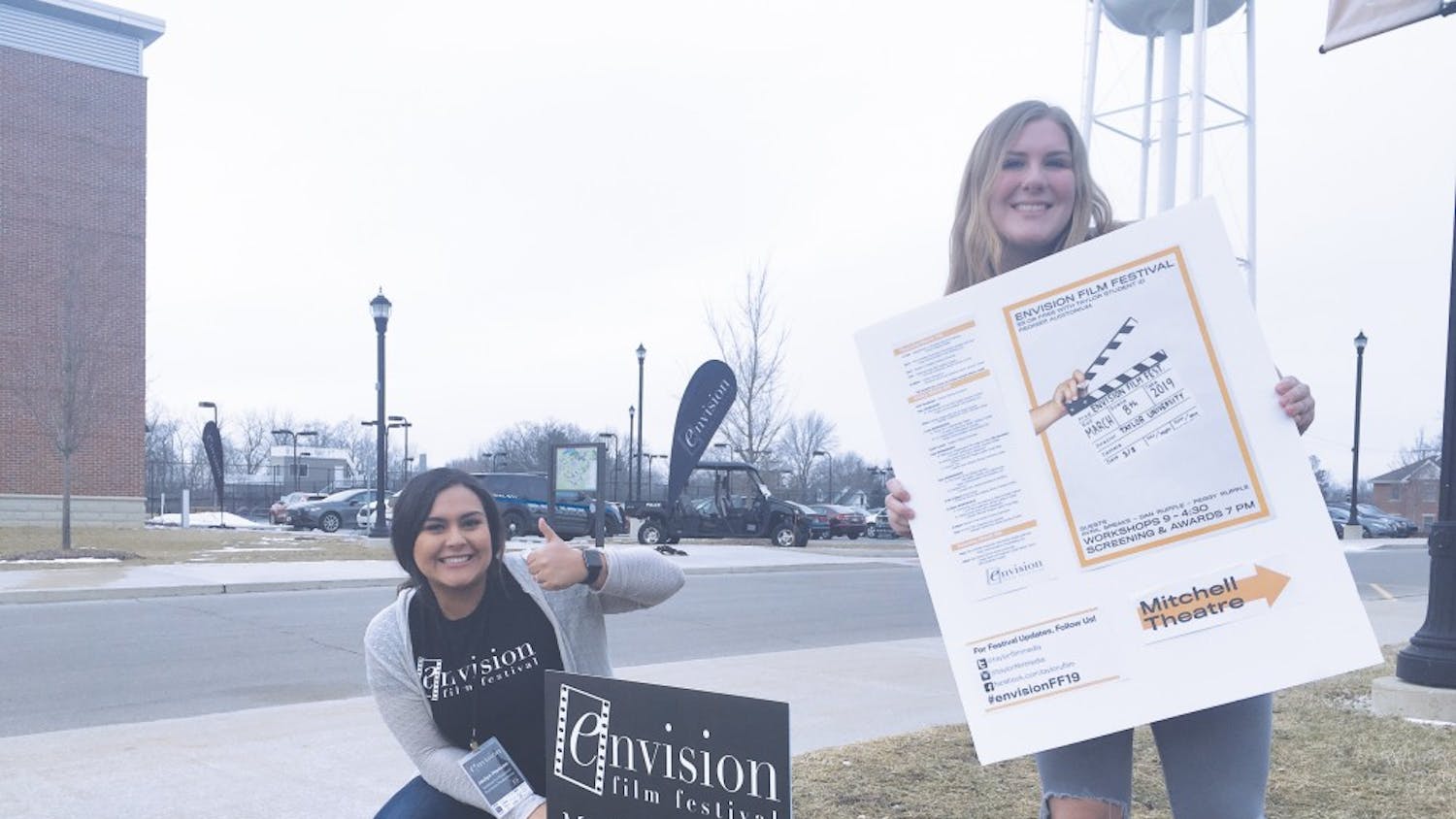David Blevins, senior Ireland correspondent for Sky News in the UK, visited Taylor on Oct. 10, bringing a message about the changing world of journalism to students.
Blevins has worked at Sky News for 23 years as a both a reporter and broadcaster, and has been given the opportunity to travel all over the world. Blevins has also interviewed five British prime ministers, two Irish presidents and two U.S. presidents.
Blevins definitely has plenty of experience up his sleeve in the field of journalism. Beyond the prominent public figures he’s interviewed, Blevins has covered the Irish move to peace after years of war and unrest.
This month, Blevins is touring throughout the U.S. to encourage young college journalists and teach them the techniques he has used during his professional career. One of those places happened to be Associate Professor of Journalism Alan Blanchard’s Introduction to Media Writing class.
“David Blevins is a very engaging speaker who tells a compelling story about his profession as a Sky News reporter based in Ireland,” Blanchard said.
Blanchard believed Blevins’s extensive knowledge of journalism had a lot to offer the class. He said Blevins talks in a genuine and transparent manner about his faith and how it affects and motivates his work as a truth-telling journalist.
Blanchard said he thinks it helps students to hear from a variety of journalists, to help them imagine the type of calling they might experience in the rapidly changing field. That’s exactly what Blevins aims to do.
“Often, when I teach at schools, I look at what it means to make hope and history rhyme,” Blevins said.
The Irish reporter made a point to mention that he is in the unusual position of being both a journalist and a Christian. He explained that in the middle of his career, he took a three-year break and went to seminary to study theology.
Blevins said it was in seminary that he discovered journalism and faith were not mutually exclusive.
“It is possible to be a Christian in the hostile secular environment that is journalism,” Blevins said. “We need journalists who understand religion.”
According to Blevins, his reason for existing boils down to who he is in Christ. He said his purpose is to encourage Christians to become involved in journalism if they feel called, and particularly, Christians who understand faith.
Sophomore Julia Gosden was one of the students in Blanchard’s class who observed Blevins’s lecture. She thought the experience was unique and interesting.
“It was special to hear someone speak who integrates their faith into their career so well,” Gosden said.
Blevins stated a Christian journalist doesn’t exist to evangelize their audience, but to perform the best possible job.
This means gathering the news ethically and reporting the news with integrity.
“In Ireland, no one uses the term Christian journalist; it’s an oxymoron,” Blevins said. “The problem is they just don’t read enough C.S. Lewis. My faith is where I continue to find the light in moments of despair.”
While juggling his faith and career has proven to be a difficult task for Blevins, he said one of the most challenging factors weighing on his heart is the current rift in journalism.
He mentioned how unthinkable politics and technology have drastically changed the face of the world, making it difficult to produce valid material. He said publishers limited by algorithms are in a rush to push stories out; this, in turn, secures revenue without accountability.
“There is so much ill-informed debate taking place because there is so much misinformation online,” Blevins said. “There is nothing to discern between credible journalism and material that may have been placed there to influence an election or referendum.”
Blevins stated that for far too long, people in high office have undermined the role of journalism in a democracy. To him, the reputation of journalism is in the gutter.
This crisis in the practice has prompted Blevins to advise journalists to start from where they are, rather than where they want to be. He stated that while the world and journalism have changed, reporting can be redeemed.
“People have lost faith in our establishment,” Blevins said. “When people are struggling to have their voices heard, journalists can repress that feeling of alienation by being their voice.”
According to Blevins, the role of a journalist is to find the facts, the truth and deliver it in an impartial way. Blevins also stated that journalism unveils beauty in three things: the people, the practice and the purpose. The people, he said, are represented through the writer; the practice applies age-old principles to the current state of the world; and the purpose nurtures imagination.
“Despair is just another version of denial,” Blevins said. “People are confronted with global, national, local crises all the time. My goodness, is the world crying out for hope; people long to feel hopeful again, and it’s the journalist’s job to challenge that hope.”
Blevins furthered his points on good journalism by encouraging students to ask questions without attacking the interviewee, listening to what the person on the other end of the conversation has to say and enter the writing process without holding any particular political view.
These techniques, he said, let people know the writer is genuinely interested in them.
“I believe journalism has changed, and changed utterly, but we must not despair for within the journalism that exists today,” Blevins said. “There is still a beauty and we can discover it.”




